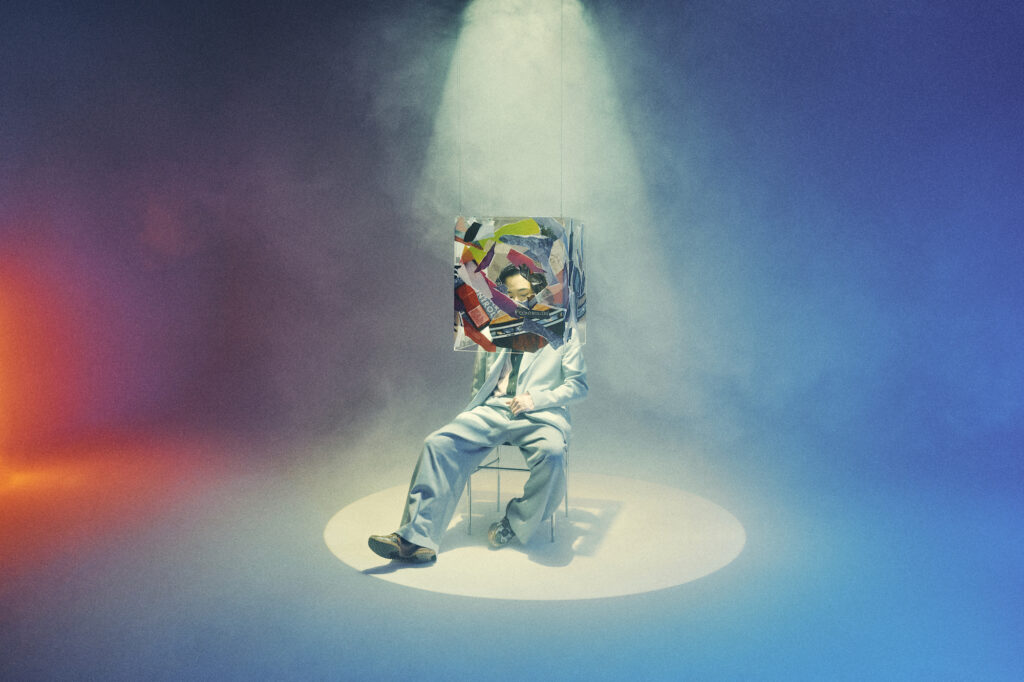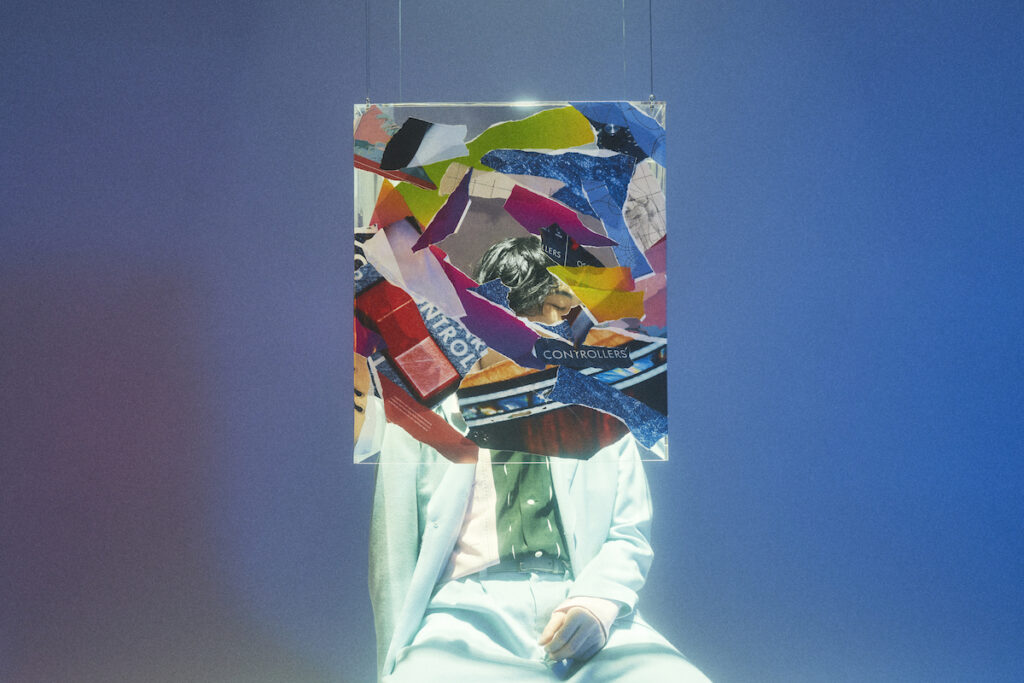This February, artist Haruno released his first EP “25”, the first in about a year and a half. He is a singer-songwriter and producer who gained fame on the Internet, known for his sound production for “Zutomayo” and “Sorane”, in addition to his original songs. This album contains 8 songs including “Angels” in collaboration with producer/guitarist Shin Sakiura, “cash out” in collaboration with Singaporean R&B band brb., and “D(evil)” in collaboration with yama. The album is a collection of songs created by Haruno’s deep confrontation with the raw feelings and emotions that come from personal experience, as well as his current views on life and death; leading up to the title “25”.
Daniel Takeda, who served as the overseas coordinator for the brb. collaboration, was our interviewer and spoke on a wide range of topics, from Haruno’s thoughts after his release of “25” to the reasons for newly showing his face, barriers in the Japanese music scene, and collaborations with international artists.
Daniel Takeda: Today, while touching on your new EP “25” released in February, I was hoping to discuss in depth about your internal motivation for creating music as an artist who mainly exists “on the Internet”. First of all, you finally got to put out “25” to the world, after putting in so much time and energy into it. Do you feel any change in your feelings before and after releasing it?
Haruno:The EP title, “25,” was taken from my actual age, and I positioned it as a turning point to change how I feel about my future into a more positive one, while simultaneously running through my past. I feel so happy now that I have released it.
Once songs are released, I can’t make any changes to it. They feel like they completely leave my hands and belong to someone else. That’s why I usually don’t look back on my work, move on to the next thing, and start thinking about the future.
Takeda:It seems like artists feel that their personal experiences are reflected in their work, and by releasing them, their stories and experiences become a part of others.
Haruno: I agree. By putting out songs, I feel that my life experiences and thoughts that I put into them become a part of other people. It is almost as if my personal experiences have a soul, and that they’re finally able to rest in peace.
Takeda: People often ask me in interviews if I feel that my work reaches people, just by reading their reactions and comments online. For me, it gives me a sense of “reality” when people I personally know tell me “I read your article and it inspired me,” compared to when some random account makes a tweet saying, “I read your article”. So I’m interested in hearing how you gain your satisfaction or affirmation when you mainly only “exist” in the online sphere?
Haruno: In my case, I’m able to generate a feeling of satisfaction within myself. I personally love the fashion brand “sacai,” which releases a collection every season, once every six months. I think this is one great example of intertwining the specific season’s theme, the current social dynamics, and fashion. I try to incorporate a similar approach when it comes to creating music. Making music to me plays a major role in “presenting a personal statement”. Of course, it would be nice if people liked my music and spread it, but since I’m confident about what I create, most of my goals have already been fulfilled by the time I release it; I’m not concerned about what others think of me or my work.
I don’t do live performances, so I rely on word of mouth online for feedback and validation, but I don’t base my self-worth on that, so maybe that’s why I’m able to stay strong.
“I decided to show my face out of a sense of inferiority.”
Takeda: So up until now you never showed your face in photos; did you feel that you could be more experimental or create an ideal image of yourself because of the anonymity?
Haruno: I used to lack confidence in my appearance, so I didn’t want to present myself in front of an audience. In the 1990s and 2000s, it was required for artists to show their face and real name in order to make any kind of public statement, but with the rise of YouTube and Nico Nico Douga, more and more people were able to identify themselves with a “theme” without using their real names. I saw the potential in that and started making music as a Vocaloid P in January 2017. Being anonymous was convenient for me because I could put out music without taking responsibility for it, for better or worse, and could always “start over” if I wanted to.
Takeda:So what made you decide to expose your face for this EP drop?
Haruno: “25” was a project for me to think about how I want to view myself in the future, and how I could improve my confidence and enhance my own dignity, but when I compared myself to artists that I respect like Justin Bieber, Ariana Grande, and Mac Miller, I felt that I had to show my face. I felt inferior to the fact that I was making music anonymously. It felt like I didn’t have any emotional growth since 2017; although I was expressing myself through lots of songs and on the surface felt like I was arming myself to be strong, but in the end I still felt inferior compared to what I really admired. When I thought about what I truly wanted to become, I had no hesitation in revealing more of myself, including showing my face.
Takeda: That must’ve been a difficult decision to make. I also think that being judged by things like age and looks is a uniquely Japanese thing. For example, there are many artists like Moe Shop and punipunidenki, who create an image of themselves through anime-style art and work closely with the artists to create their aesthetic. I feel that this is inversely very Japanese, and like V-Tubers, Japanese people have a strong desire to “become someone else”. I feel like this is because Japanese society has such strong norms and is so judgemental, and it is very difficult to escape from the parameters that “define” who you are. You’re constantly defined by what university you went to or what your family is like, and it is very difficult to change yourself (or your body). I think there is a strong desire to escape, a desire to transform oneself to become a different person online.
Haruno: I am probably one of those people, and I also feel that there are people in the Japanese music scene now who have “recreated” what attributes they choose to identify by.
Takeda: This may be a little off the topic of judgment and attributes, but artists like you, Shin Sakiura and A.G.O. (who are featured on “25”) are providing tracks to lots of artists as beat makers. In Japan, I unfortunately think that the significance of the contributions of these artists is something that only very hardcore fans and listeners understand. Would you agree that In Japan, there is still a tendency that only bands and singer-songwriters are appreciated?
Haruno: I think that taglines such as singer-songwriter, vocalist in a band, guitarist in a band, etc. still account for a large percentage in Japan for some reason. I think beat makers tend to be underrated and underappreciated.
There are two songs on “25” that A.G.O. produced the tracks on, and I think that is something that really needs to be recognized more. I don’t think there is much interest in such contributions Japan, including in the media. In my case, I started out as a vocaloid P, so I feel that what vocaloid Ps and beat makers do is not that different. Vocaloid Ps who don’t write lyrics are technically the same thing as beat makers active in the pop scene, but just the name “vocaloid P” garners a lot of attention, and there are many core fans who follow the scene closely. Personally, I think beat makers should be more recognized, and I feel like that is an issue in the current Japanese music scene. I felt this more this time around as I had lots of people involved in my project, including mixing and mastering.
Collaborating with overseas artists
Haruno: I collaborated with the Singaporean band brb. on “cash out feat. brb.” which has been garnering attention, which I am grateful for; but I do think that there’s not a lot of collaborations like this happening in Japan yet. Especially after Spotify and Apple Music have gone global, music now truly has no borders. But in Japan, the majority of the market revolves around the domestic market, so I feel that there are still many inward-looking approaches to creating music and marketing it. That’s why I was surprised to see c collaborations like ¥ellow Bucks working with ØZI, and I felt that we had to take our own steps forward for the future of the scene. Still, it is difficult to collaborate with foreign artists, and it was through your mediation that we were able to successfully release the work with brb. this time, and I am very grateful for that.
Takeda: Thank you for your kind words! For example, many artists from Singapore and Taiwan think that the music scene in their countries is small, so they look at the Japanese music scene and feel jealous of such a “rich” domestic culture that is somewhat self-sustainable. They respect the Japanese music industry, and there are many artists that want to collaborate with Japanese artists, but now the problem is that there aren’t enough bilingual/bicultural people that are able to mediate and direct these international collaboration projects.
When collaborating to make music, every interaction between artists is a sharing of cultural values, and even the slightest discrepancy can have a major impact on the song that’s being created. Because artists are essentially creating “something out of nothing”, communication becomes extremely important, and the way the project is directed and the process itself can have a great impact on the final product.
This is why when asking overseas producers and artists to collaborate, it is very important that they understand the culture of the artists that you’re working with, and the context involved in the songwriting process. After doing a lot of remote work due to COVID, I feel that the quality of communication and cross-cultural communication is even more important since most interactions are now limited to verbal communication and maybe deciphering some facial expressions over Zoom.
Haruno: That is a task that definitely requires a lot of energy and is very difficult. In the two years since COVID, I feel that the Japanese scene, including myself, has been steadily moving forward in terms of collaborating with overseas artists and creators. From this point forward, I think it will be increasingly difficult because it will test our understanding of non-Japanese music scenes, as well as our sincerity towards them, but personally I would like to continue learning and understanding more about the music that’s happening in the world. That is why I think it is so important to have someone like you who properly understands and appreciates what we are doing.
I run my social media accounts like a fashion brand account, and I generally don’t express my opinions on them, because music is a great way for me to express my thoughts. In reality, I do think that I should show more appreciation to people like you and A.G.O. in a big way, by mentioning your names. I have said it in interviews like this, but I feel it’s still not enough. It remains a challenge for me to figure out what I really want to become in the future.
Takeda: Every time I do an interview, it becomes a reflection session (laughs).
Haruno: “25” is a project that encompasses my life to date in order to explore what I want to become in the future, so I feel that finding issues and raising questions to myself is a crucial process. It was meaningful for me to talk with you today, and express my position in this way. After all, it is not often that you get a chance to look at yourself in a new light unless you’re given such a specific opportunity. Perhaps I am trying to confirm my own perception by talking to the media like this.
Haruno
A singer/songwriter/producer of the next generation from the Internet, he is a multi-talented artist who writes lyrics, composes music, and even creates his own tracks.His EP “IS SHE ANYBODY?” released in 2020 debuted at No. 1 on the R&B charts of iTunes and Apple Music, and his EP “25” was released in February 2022.In February 2022, he released the EP “25.
https://haruno-official.com
Twitter:@xupxq_
Instagram:@iswhooo
YouTube https://www.youtube.com/c/harunoiswhoo

Daniel Takeda
Born in California, currently living in the US. With experience in consulting for major labels for artist PR and management, currently works as a freelance music agent and journalist. Topics specialized in their writing are “culture, identity and society”, narrated from a uniquely global and “Gen Z” perspective.
Twitter:@daniel_takedaa



